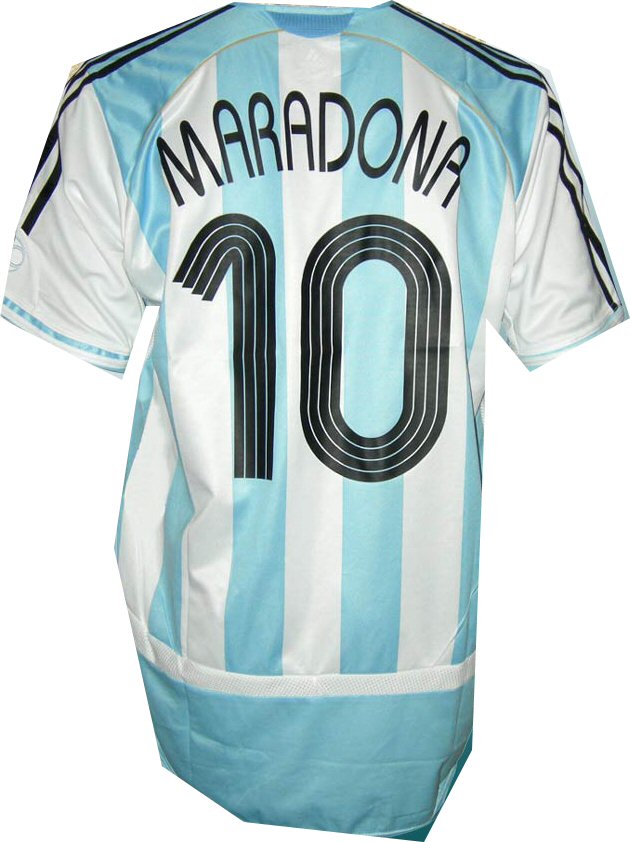



![]()




Diego Armando Maradona is arguably the greatest footballer that has ever put on a pair of boots. He is born in the slums of Villa Fiorito near Buenos Aires as the fifth of eight children. Maradona enters professional football at the astonishing age of 15. By the time he turns 16, Diego is called in the senior national squad of Argentina. Regardless of his talent, Diego is considered too young by coach Cesar Menotti, who rejects him from his selection for the 1978 World Cup. Bitterly disappointed, Maradona watches the tournament from home as his country wins gold. In the following four years, Diego dominates his country's domestic league and is eventually added to the Argentine squad for Spain 1982.
Argentina advances from the first stage of the tournament by losing to Belgium, but beating Hungary and Salvador. Maradona manages to leave his mark with two beautiful, yet not critical goals. In the the second stage of the tournament, Maradona is manhandled by his Italian marker Claudio Gentile. Diego's frustration gets him sent off. Argentina fails to advance and Diego is again suppressed from unleashing his full potential. Although unsuccessful, the brilliance of the Argentine footballer does not go unnoticed and after the World Cup, he is picked up by European powerhouse Barcelona. By 1984, Maradona had established himself in Barca and is picked up by the Italian club Napoli.
At the 1986 World Cup in Mexico, Maradona makes his return on the World stage in a spectacular fashion. After leading his team to a quarter final against England, Diego steals the attention of millions with both his controversial character and technical brilliance. The fuss around the Argentina-England encounter is further elevated by the Falkland Islands conflict, which at that time had turned both countries against each other. Diego opens the game 1-0 by striking the ball with his hand over the English goalkeeper Shilton. Unnoticed by the referees, the mishap is ruled a goal. Five minutes later, Maradona single handedly takes the ball through the entire English defense with a slalom from midfield right down to the goal line. After the match, when confronted with the video footage of the illegal goal, Maradona replies simply "Even if there was a hand, it must have been the hand of God." Maradona silenced his critics by deciding the following semi and final matches. By scoring two goals in the first and with an assist in the second, Maradona practically earns the World Cup for his nation.
Maradona's influence on his teammates was carried over to his club side Napoli, as they reached unprecedented heights, winning their very first and second Scudetto (1997 and 1990) and the UEFA Cup in 1988/99.
At Italy 1990, all eyes are on Argentina and its brightest star Diego Maradona. Diego comes close to replicating his success from four years ago. With Maradona's ability, Argentina defeats Brazil, Yugoslavia and Italy on its way to the final. Most memorable is the semi-final match between Argentina and Italy played at Diego's club home Naples. To the torment of Maradona, the fans at his own club stadium boo him during the match. Nevertheless, Argentina eliminates Italy after a penalty shootout. The final of the 1990 World Cup, leaves Diego helpless as Argentina are defeated 0-1 by West Germany with a goal from a questionable penalty.
After the loss against West Germany, Maradona's career plummets. In March of 1991, he tested positive for doping and is banned from football for 15 months. Maradona refuses to return back to Napoli after the World Cup incident and transferrs to Sevilla for a year. He eventually goes back to Argentina with Newell's Old Boys.
The 1994 World Cup confirms that Diego's career in international football is over. He is suspended again after failing yet another doping test. Hurt by his absence, Argentina is eventually eliminated by Romania in the second stage.
Shortly after, Diego takes on a new career path as a coach. He fails miserably again, unable to remain at a single club for more than four months. By 1995, Maradona is forced to return to the game as a player. He goes back to his former club Boca Juniors, and remains there until his last match on 25th of October 1997. Five days later, during his 37th birthday, Maradona announces his retirement from football. Up until 2001, Diego remains away from the playing pitch, periodically entering rehab for cocaine abuse. Diego plays his farewell match on the 10th of November 2001 against a select team comprised by some of the greatest footballers in the game including Ferrara, Suker, Stoichkov, Cantona, Higuita, and Romario. One year earlier, Maradona is voted Best Football Player of the Century by a global Internet poll. Controversy is stirred yet again, by his nearly unanimous victory. FIFA, who find Maradona's personal image as the 'King of Football' unacceptable, decide to give the same award to Pelé as the Best Footballer for the first half of the century
Source Article : http://expertfootball.com/players/maradona/biography.php
Wednesday, December 31, 2008
Browse » Home »
The Legend Player
» Diego Armando Maradona : The Legend from Argentina
Diego Armando Maradona : The Legend from Argentina
Posted by Unknown at 9:58 AM
Labels: The Legend Player
Subscribe to:
Post Comments (Atom)






























0 comments:
Post a Comment